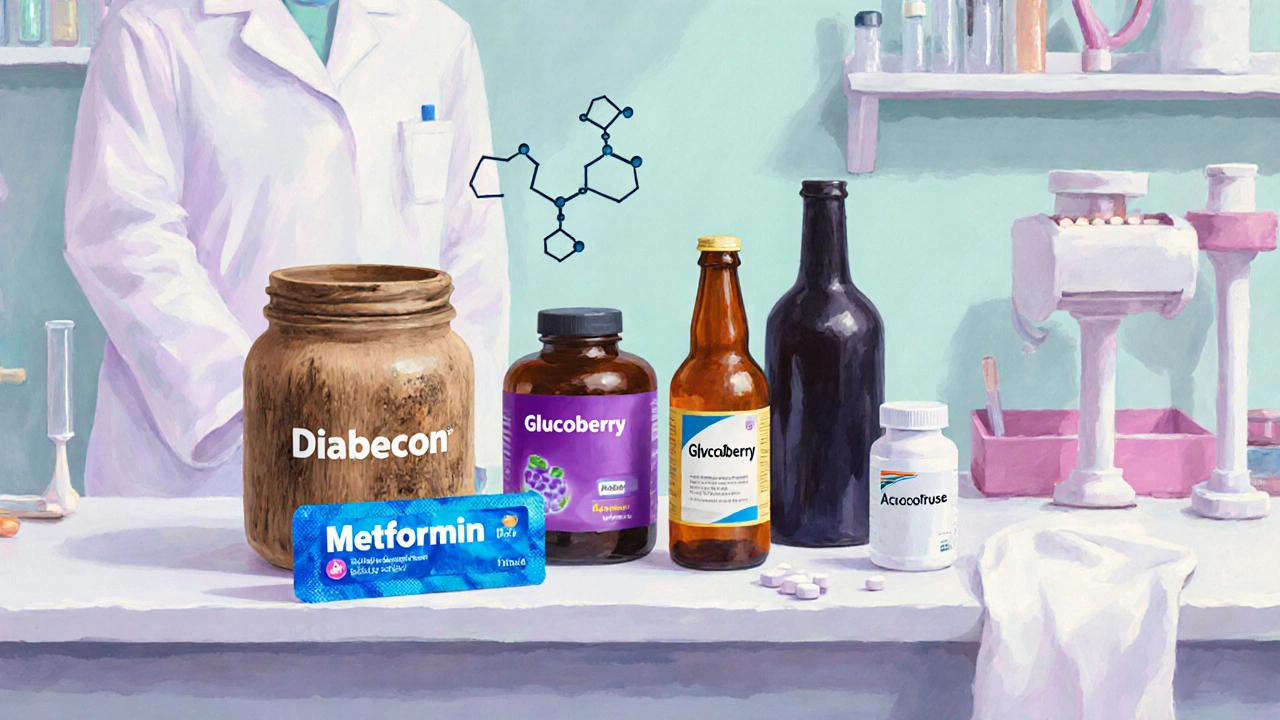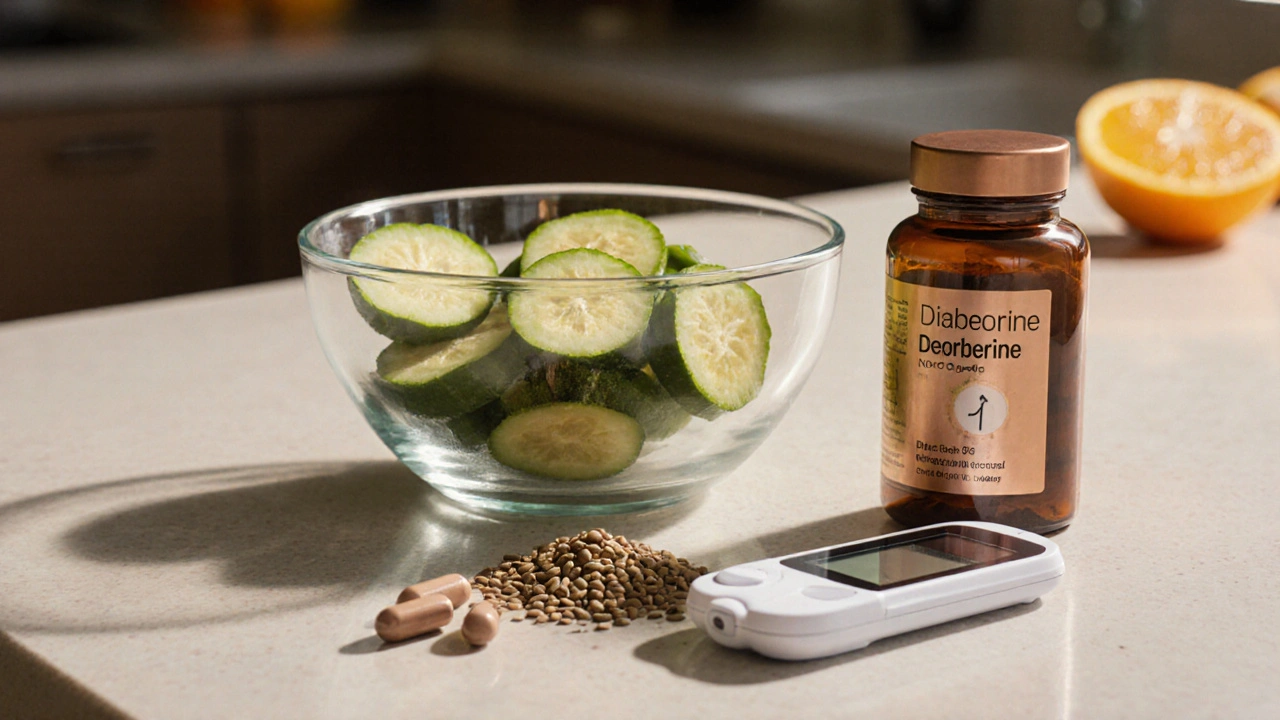Diabetes Supplement Finder
This tool helps you identify the diabetes supplement most suitable for your specific health needs and circumstances. Based on your answers, it will provide personalized recommendations for Diabecon and other popular options mentioned in the article.
Your Personalized Recommendation
Key Comparison
| Attribute | Diabecon | Metformin | Glycoberry | GlucoTrust | Acarbose |
|---|---|---|---|---|---|
| Best for your profile | |||||
| Clinical Evidence | |||||
| Cost per month | |||||
| Side Effects |
Quick Takeaways
- Diabecon is a herbal blend targeting post‑meal glucose spikes.
- Metformin remains the most clinically proven prescription for blood sugar control.
- Glycoberry and GlucoTrust offer comparable natural ingredients with clearer third‑party testing.
- Side‑effects are rare for Diabecon, but drug interactions can occur with some medicines.
- Choose based on clinical evidence, ingredient transparency, and personal health goals.
What is Diabecon?
Diabecon is marketed as an Ayurvedic supplement designed to support healthy blood sugar levels for people with type2 diabetes. It combines a mix of herbal extracts such as bitter gourd, fenugreek, and berberine, along with vitamins and minerals that are said to improve insulin sensitivity.
If you’re looking for a natural diabetes supplement, Diabecon promises a gentle, non‑prescription approach to glucose management.
How Diabecon claims to work
The formulation relies on three main mechanisms:
- Berberine is believed to activate AMP‑activated protein kinase (AMPK), a pathway that helps cells use glucose more efficiently.
- Fenugreek seed fiber may slow carbohydrate absorption in the gut, reducing post‑meal spikes.
- VitaminD and magnesium support pancreatic beta‑cell function, according to several small trials.
While these actions are biologically plausible, most evidence comes from in‑vitro or animal studies rather than large human trials.

Key factors to compare diabetes supplements
When you stack Diabecon against other options, keep an eye on these criteria:
- Clinical evidence: Number and quality of human studies, sample size, and peer‑review status.
- Ingredient transparency: Full disclosure of each herb, dosage, and source.
- Regulatory status: FDA classification, GMP certification, and third‑party testing.
- Safety profile: Reported side‑effects, contraindications, and drug interactions.
- Cost per month: Price relative to dosage and expected benefit.
Top alternatives to Diabecon
Below are four widely‑available alternatives that often appear in the same search results.
Metformin is a prescription biguanide that lowers hepatic glucose production. It is considered first‑line therapy for type2 diabetes and has decades of outcome data.
Glycoberry is a non‑prescription supplement featuring a blend of cranberry extract, cinnamon, and chromium picolinate, advertised for “blood sugar balance”.
GlucoTrust combines guarana, alpha‑lipoic acid, and a proprietary “glucose‑support complex”. The brand emphasizes sleep‑related glucose regulation.
Acarbose is an oral alpha‑glucosidase inhibitor that delays carbohydrate digestion. It is prescription‑only in many countries but occasionally appears as an over‑the‑counter option in Asia.
For technology‑savvy users, GlucoseBuddy is an app that syncs with glucometers and offers dietary recommendations, not a supplement but a complementary tool.
All these products fall under the broader umbrella of Ayurvedic medicine or conventional pharmacology, depending on the formulation.
Side‑by‑side comparison
| Attribute | Diabecon | Metformin | Glycoberry | GlucoTrust | Acarbose |
|---|---|---|---|---|---|
| Type | Herbal supplement (OTC) | Prescription drug | Herbal supplement (OTC) | Herbal supplement (OTC) | Prescription drug (OTC in some regions) |
| Key actives | Berberine, fenugreek, bitter gourd | Metformin hydrochloride | Cranberry extract, cinnamon, chromium | Guarana, alpha‑lipoic acid, melatonin | Acarbose |
| Clinical evidence | Limited human trials (n<100) | Extensive RCTs (>10,000 pts) | Small pilot studies (n≈50) | No published RCTs | Moderate RCT data (n≈500) |
| FDA status | Dietary supplement (GRAS) | Approved drug | Dietary supplement (GRAS) | Dietary supplement (GRAS) | Approved drug (some OTC markets) |
| Typical price (30days) | $35-$45 | $20-$30 (generic) | $30-$40 | $40-$55 | $25-$35 |
| Common side‑effects | Mild GI upset | Nausea, lactic acidosis (rare) | Stomach discomfort | Insomnia (due to guarana) | Flatulence, abdominal pain |
| Drug interactions | Potential with cytochrome‑P450 substrates | Contraindicated with contrast dyes, alcohol | Minimal | May increase caffeine effects | Interaction with sulfonylureas |

Best fit scenarios
Diabecon shines for users who prefer an all‑herbal approach and want to avoid prescription meds. It works well as a complement to diet and exercise, especially for those with mild hyperglycemia.
Choose Metformin if you need proven HbA1c reduction and have been diagnosed with moderate to severe type2 diabetes.
Glycoberry is a good starter for people curious about antioxidants and who want a budget‑friendly option.
GlucoTrust may appeal to night‑shift workers looking for sleep‑linked glucose support.
Consider Acarbose when post‑prandial spikes are the main issue and you can tolerate GI side‑effects.
Safety, regulation, and potential side effects
All supplements listed are classified as dietary supplements under the U.S. Food and Drug Administration (FDA). This means they are not required to undergo the same pre‑market approval as prescription drugs. Look for third‑party certifications like USP, NSF, or GMP to ensure quality.
Herbal blends can still interact with blood‑thinning agents, certain antibiotics, or insulin. Always consult a healthcare professional before adding any new product.
How to choose the right option
- Assess your current glycemic control (fasting glucose, HbA1c).
- Identify any existing prescriptions that might clash with herbal ingredients.
- Prioritize products with transparent labeling and third‑party testing.
- Consider cost per dose and whether insurance covers any prescription.
- Start with a short trial (2-4 weeks) and monitor blood sugar trends.
Frequently Asked Questions
Is Diabecon safe to use with Metformin?
Generally yes, but because Diabecon contains berberine, which can affect cytochrome‑P450 enzymes, you should watch for increased drug levels. Talk to your doctor before combining them.
How long does it take to see results with Diabecon?
Most users report modest improvements in fasting glucose after 4-6 weeks, but significant HbA1c changes may require 3 months of consistent use alongside diet.
Can I replace my prescription with Diabecon?
No. Diabecon is a supplement, not a medication. It can support lifestyle changes, but it should not replace prescribed therapy without medical supervision.
What is the best time of day to take Diabecon?
The label recommends taking one capsule with the largest carbohydrate‑rich meal of the day to help blunt post‑prandial spikes.
Are there any labs that have tested Diabecon’s purity?
A few independent labs in India and the U.S. have published reports confirming that the berberine content matches the label claim, but large‑scale third‑party certifications are still limited.

Dhanu Sharma
October 12, 2025 AT 04:22